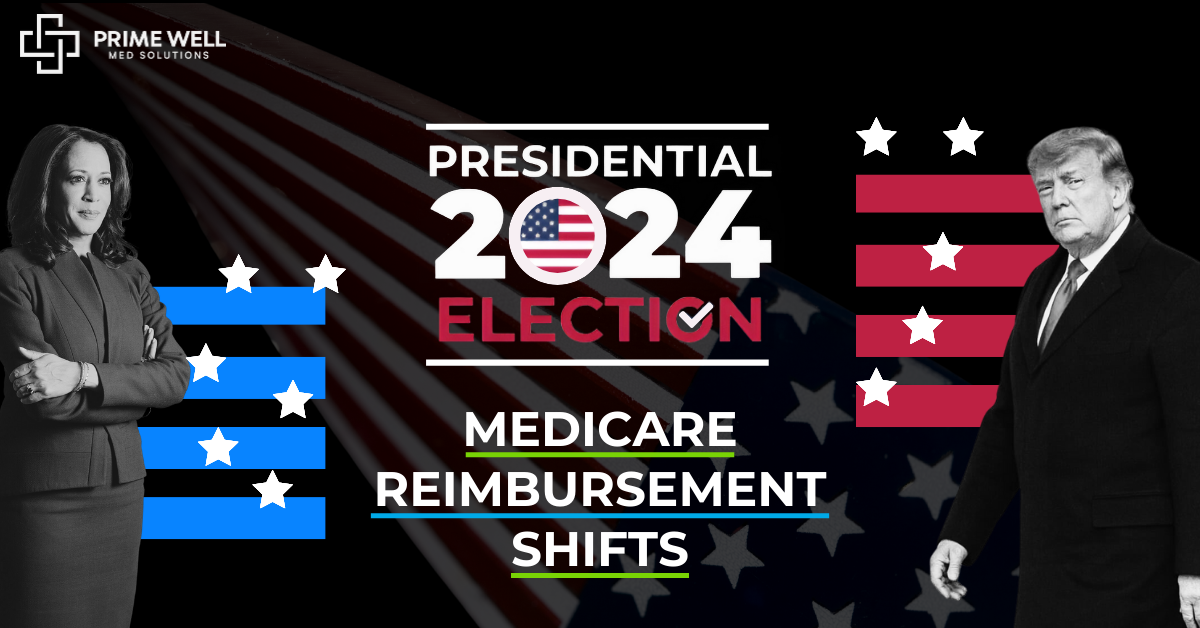Doctors across the country are feeling more pressure than ever. With Medicare payments decreasing, rising costs, staff shortages and growing administrative work, many medical practices are struggling to keep up.
Over the past few years in Medicare Reimbursement, Medicare hasn’t adjusted payment rates to match the increasing expenses of healthcare operations. In 2022, Medicare’s Fee-for-Service (FFS) program reached an all-time low, with a negative margin of -11.6%, even after federal aid. This isn’t just a financial problem; it’s about ensuring millions of Americans can still access quality care.
As the 2024 election approaches, reforming Medicare payments has become a key issue. Both political parties are suggesting different solutions, which could significantly impact the survival of small and independent medical practices.
This election will decide if healthcare practices can succeed or will struggle to stay afloat, and if patients can keep getting the care they need. Knowing where each candidate stands is essential for facing an uncertain future.
Let’s take a closer look!
How Each Candidate Plans to Tackle Medicare Reimbursement!
Donald Trump – Deregulation and Spending Cuts
Donald Trump’s approach focuses on reducing regulations and cutting federal spending, including possible limits on Medicare funding. While fewer regulations could mean less paperwork, his plan might lead to Medicare cuts, lowering practice income and limiting their ability to serve Medicare patients.
His goal of a smaller federal government means practices may face tighter budgets and will need to handle financial challenges more independently.
Kamala Harris – Equitable Access and Physician Sustainability
Kamala Harris favors Medicare reforms to help relieve financial stress on healthcare providers. She prefers to update doctor payments to match inflation, ensuring that Medicare Reimbursement rates stay in line with costs. She wants to promote fair access to healthcare by supporting policies that help small practices and encourage high-quality, value-based care.
Influence of 2024 Payment Policies on Medicare Reform and Politics
Latest Updates to the Physician Fee Schedule (PFS)
The proposed 3.34% reduction in Medicare’s conversion factor for 2024 by CMS is significant. Kamala Harris wants to counteract these cuts with payment reforms that adjust for inflation to help keep medical practices, especially smaller ones, financially stable. This approach highlights the importance of secure sufficient Medicare reimbursement to support healthcare providers and maintain access to care.
On the other hand, Donald Trump aims to cut federal spending, which means those reductions will likely take place.
The Value-Based Care Incentives
CMS’s value-based care incentives are also part of Medicare reform. Harris supports expanding these incentives to focus on rewarding quality of care instead of just the number of services provided. This shift could increase Medicare reimbursement for practices utilizing value-based models, helping to balance their income & promote better patient results.
Trump doesn’t discuss value-based care, favoring a more market-driven approach that might reduce federal support for practices making this shift. The candidates’ views show different ideas about care quality and the stability of payments.
Legislation and Reform – A Critical Discussion Point!
HR 2474
The Strengthened Medicare for Patients and Providers Act (HR 2474) aims to adjust doctor pay to keep up with inflation. Its goal is to help close the gap between rising costs and flat Medicare payments.
Kamala Harris is likely to support HR 2474 because it aligns with her views on fair pay for providers and access to healthcare.
On the other hand, Donald Trump will probably oppose it since he doesn’t want to increase federal spending on Medicare. His focus on cutting costs suggests he would be against reforms that automatically raise Medicare reimbursement rates.
MIPS and MACRA
The Merit-based Incentive Payment System (MIPS) and the Medicare Access and CHIP Reauthorization Act (MACRA) have been challenging for providers, including MIPS Healthcare Company, bringing more paperwork with little reward.
Kamala Harris is open to adjusting these programs to cut down on paperwork and ensure that payments are linked to quality of care.
In contrast, Donald Trump will likely keep these programs as they are and support a less regulated healthcare system. Under Trump, MIPS and MACRA would continue without significant changes, keeping all their complexity and administrative demands, which could impact Medicare reimbursement for providers & limit their ability to Adjust to more streamlined payment Representations.
Equity-Focused Reforms and Health Access – Two Distinct Perspectives!
CMS’s Equity-Centered Strategy
In 2024, CMS launched programs aimed at reducing health disparities by encouraging care for underserved communities and supporting holistic care for patients. These two initiatives focus on providing fair access by compensating practices that help marginalized groups and offer comprehensive, patient-centered care.
Kamala Harris supports fair access to healthcare. She is likely to back CMS’s equity-focused initiatives. She believes these reforms are essential for closing healthcare gaps for underserved populations.
On the other hand, Donald Trump favors reducing federal involvement, and he may not support these programs. His desire to cut federal spending and shift healthcare to the private sector could lead to decreased Medicare reimbursement for providers undermining action that promote equity and accessibility in healthcare.
This difference in priorities highlights how the two candidates have contrasting views on tackling healthcare inequalities and ensuring fair access to care.
Implications for Your Practice
Increasing Costs and Practice Longevity
The 2024 election will affect how well practices can operate based on Medicare reimbursement. Kamala Harris supports adjusting payments for inflation to help practices manage rising costs. This approach will lighten the financial load, particularly for small and independent practices.
While Donald Trump plans to cut federal spending, which could lead to more payment reductions. As a result, practices may have to make difficult choices, such as laying off staff or limiting services for Medicare patients.
Access to Medicare Patients
Harris’s plan will ensure that payment rates keep up with the economy, allowing practices to keep seeing Medicare patients without financial stress.
In contrast, Trump’s cuts will lower Medicare reimbursement rates, which could reduce access to care for patients, especially in underserved areas where Medicare plays a big role. The candidates’ policies will influence whether Medicare patients can continue to receive the care they need without interruptions.
The 2024 Election – Call for Permanent Reform!
The 2024 election is a key moment for Medicare payments. We need permanent changes to ensure payment rates match costs and meet the needs of modern healthcare.
Effective Medicare reimbursement policies are essential not just for the financial well-being of practices but also for making sure people have access to care across the country. Moreover, healthcare professionals need to stay informed and active to shape policies that support their practices.
Sources:
- Medicare Payment Advisory Commission. March 2024 report to the Congress: Medicare payment policy. MedPAC.gov.
- Centers for Medicare & Medicaid Services. Calendar year (CY) 2024 Medicare physician fee schedule proposed rule. CMS.gov.
- U.S. Congress. H.R.2474 – Strengthening Medicare for Patients and Providers Act of 2023. Congress.gov.
- Kamala Harris and Donald Trump on the issues, 2020-2024. Ballotpedia.org.
- Kamala Harris and Donald Trump policies compared. Newsweek.com.





